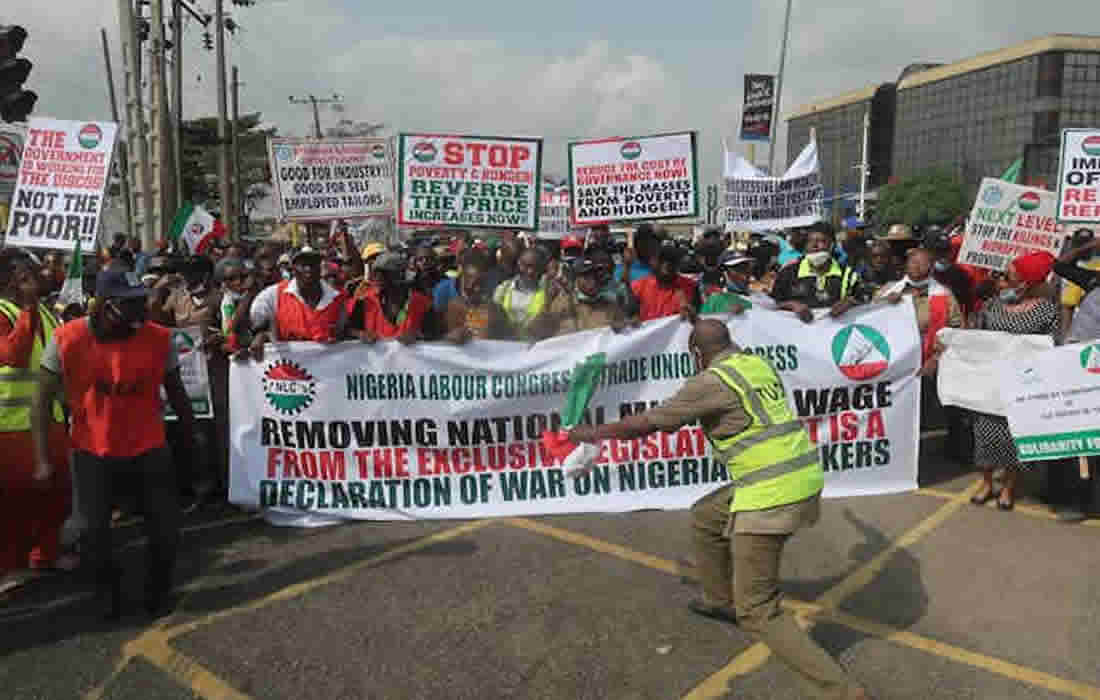“Wages have emerged as the foremost concern for Nigeria’s organized labor movements over the past year. In response to recent surges in the cost of living, labor leaders have been advocating for an increase in the national minimum wage, which is currently set at ₦30,000 (US$39) per month.“
“Nigeria’s minimum wage, intended as a safety net for workers, has long failed to provide adequate protection against poverty. Despite periodic increases, the wage remains insufficient to meet the basic needs of many Nigerians, leaving a significant portion of the workforce struggling to survive. This persistent gap between the minimum wage and the cost of living is rooted in several key factors that continue to undermine the effectiveness of wage policies in lifting workers out of poverty.
The Inadequacy of the Minimum Wage
Nigeria’s current minimum wage stands at ₦30,000 per month, roughly equivalent to $39 USD. While this figure represents an improvement from the previous ₦18,000, it falls far short of what is needed to sustain a decent standard of living in the country. With inflation steadily rising and the cost of basic goods and services increasing, the purchasing power of the minimum wage has been significantly eroded.
For many workers, the minimum wage is barely enough to cover essentials like food, housing, transportation, and healthcare. In urban areas, where the cost of living is particularly high, the wage is often insufficient to pay for rent, let alone other necessities. As a result, workers on the minimum wage frequently find themselves trapped in a cycle of poverty, unable to afford even the most basic level of comfort and security.
Inflation and the Rising Cost of Living
One of the most significant challenges facing Nigerian workers is the country’s high inflation rate. Over the past few years, inflation has consistently outpaced wage growth, meaning that even as nominal wages increase, the real value of those wages declines. This discrepancy between wage increases and the rising cost of living means that workers are losing purchasing power, effectively making them poorer over time.
For instance, the prices of food staples such as rice, beans, and yam have surged in recent years, placing additional pressure on household budgets. Transportation costs, driven up by fluctuating fuel prices, have also become a significant burden for low-wage workers. The overall effect is that the minimum wage, even when adjusted, is unable to keep pace with the economic realities faced by the average Nigerian worker.
The Informal Sector and Wage Enforcement
Another factor contributing to the ineffectiveness of Nigeria’s minimum wage is the prevalence of the informal sector, which accounts for a large portion of the country’s workforce. Many workers in this sector are employed in unregulated jobs that do not offer the protections guaranteed by formal employment, including the minimum wage. As a result, these workers often earn far less than the statutory minimum, with little recourse to demand higher wages.
Even in the formal sector, enforcement of the minimum wage is inconsistent. Many employers, particularly in small and medium-sized enterprises (SMEs), either cannot afford to pay the minimum wage or choose to flout the law, knowing that the likelihood of facing penalties is low. This lack of enforcement undermines the minimum wage’s purpose and leaves many workers earning far below what is legally mandated.
Economic Inequality and Structural Issues
Nigeria’s minimum wage problem is also symptomatic of deeper structural issues within the economy. The country suffers from widespread economic inequality, with a significant gap between the wealthy and the poor. This inequality is exacerbated by factors such as unemployment, underemployment, and a lack of access to education and skills training, all of which limit opportunities for upward mobility.
Additionally, the Nigerian economy is heavily dependent on oil, making it vulnerable to global price fluctuations. Economic downturns, often triggered by drops in oil prices, lead to government austerity measures and cuts in public spending, which in turn impact wage policies and the ability of the government to enforce labor laws effectively.
The Need for Comprehensive Reform
To truly protect workers from poverty, Nigeria’s minimum wage policy needs to be part of a broader strategy that addresses the underlying economic challenges facing the country. This includes tackling inflation through sound fiscal and monetary policies, investing in infrastructure and social services, and promoting economic diversification to reduce dependence on oil.
Moreover, the government must strengthen the enforcement of labor laws and extend protections to the informal sector. This could involve formalizing more jobs, improving labor inspection services, and ensuring that all workers have access to legal recourse if their rights are violated.
Another crucial step is to ensure that wage adjustments are linked to the cost of living and inflation, rather than being implemented sporadically in response to political pressures. Establishing a more systematic and transparent process for reviewing and adjusting the minimum wage would help ensure that it remains relevant and effective in protecting workers from poverty.
Conclusion
Nigeria’s minimum wage has never adequately protected workers from poverty due to a combination of economic factors, weak enforcement, and structural inequalities. Without comprehensive reforms that address these underlying issues, the minimum wage will continue to fall short of its goal, leaving millions of Nigerian workers struggling to make ends meet. Ensuring that the minimum wage can truly lift workers out of poverty requires not just periodic increases, but a holistic approach that tackles the broader economic challenges facing the country.





